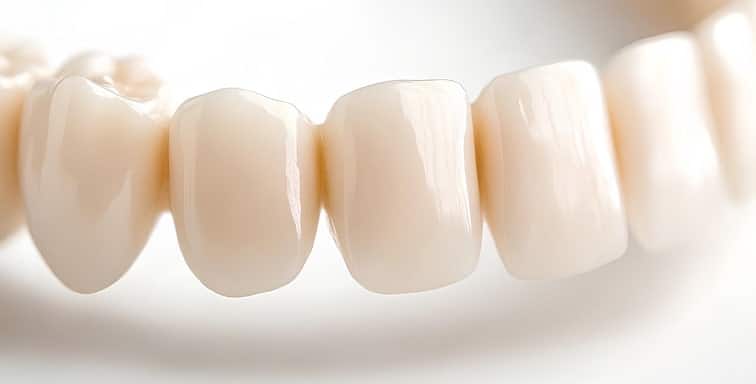Crowns and Bridges
The Differences Between a Crown and a Bridge
At Mall Road Dental, we understand that understanding the differences between dental crowns and bridges is key to making informed decisions about your oral health. A dental crown is a custom-made cap that completely covers a damaged tooth, restoring its shape, size, strength, and appearance. It’s typically used when a tooth has suffered significant decay, fractures, or needs protection after a root canal. Crowns provide a strong, durable solution for a single compromised tooth.
In contrast, a dental bridge is used to replace one or more missing teeth by spanning the gap between existing teeth or implants. It consists of artificial teeth (pontics) held in place by crowns cemented onto the natural teeth or implants on either side of the gap. While a crown addresses a single compromised tooth, a bridge focuses on restoring function and aesthetics when multiple teeth are missing, preventing remaining teeth from shifting and maintaining your bite. Both crowns and bridges offer effective solutions for various dental concerns at Mall Road Dental, and our team can help determine the best option for your individual needs.
Types of Crowns Available
Dental crowns can be fabricated from a variety of materials, each offering distinct advantages depending on the specific dental need and aesthetic preference. Common materials include:




(Such as Gold or Nickel-Chromium)


Conversely, a metal or zirconia crown would be more appropriate for a back molar due to its superior strength and resistance to wear and tear, where aesthetics are less of a concern. PFM crowns offer a compromise, combining the strength of a metal base with the aesthetic appeal of a porcelain exterior. Your dentist will discuss these options with you to determine the best material for your individual case, ensuring both functionality and a pleasing appearance.
When to Consider a Dental Bridge

At Mall Road Dental, patients often inquire about the best option for replacing missing teeth: a dental bridge or a dental implant. While dental implants are frequently considered the gold standard due to their longevity and ability to preserve bone, there are specific scenarios where a dental bridge might be a more suitable choice.

One primary consideration for choosing a bridge over an implant is when the teeth adjacent to the gap already require crowns due to significant decay, large fillings, or fractures. In such cases, preparing these teeth for crowns as part of a bridge serves a dual purpose: it addresses their existing issues while also providing support for the replacement tooth, streamlining the treatment process.

Another key factor in deciding between a bridge and an implant at Mall Road Dental is the patient's overall health and bone density. If a patient has insufficient bone in the jaw to support an implant and is not a candidate for bone grafting, or if we have certain medical conditions that contraindicate oral surgery, a dental bridge offers a less invasive alternative.

Furthermore, the cost and treatment timeline can influence the decision; bridges generally have a lower upfront cost and a shorter completion time compared to implants, which can involve multiple surgical procedures and a longer healing period. Ultimately, the best choice depends on a comprehensive evaluation of the individual's oral health, budget, and personal preferences, all of which our team at Mall Road Dental is equipped to discuss.

Comfortable Procedures at Mall Road Dental
At Mall Road Dental, the team is dedicated to ensuring that getting crowns and bridges is a comfortable and non-stressful experience for every patient. From the moment you step into the office, the staff strives to create a relaxing environment. We understand that dental procedures can often cause anxiety. we take the time to thoroughly explain each step of the crown or bridge process, addressing any concerns and answering questions to alleviate worries. With a gentle approach and a focus on personalized care, the Mall Road Dental team utilizes modern techniques and technologies to minimize discomfort, allowing patients to feel at ease throughout their treatment.

